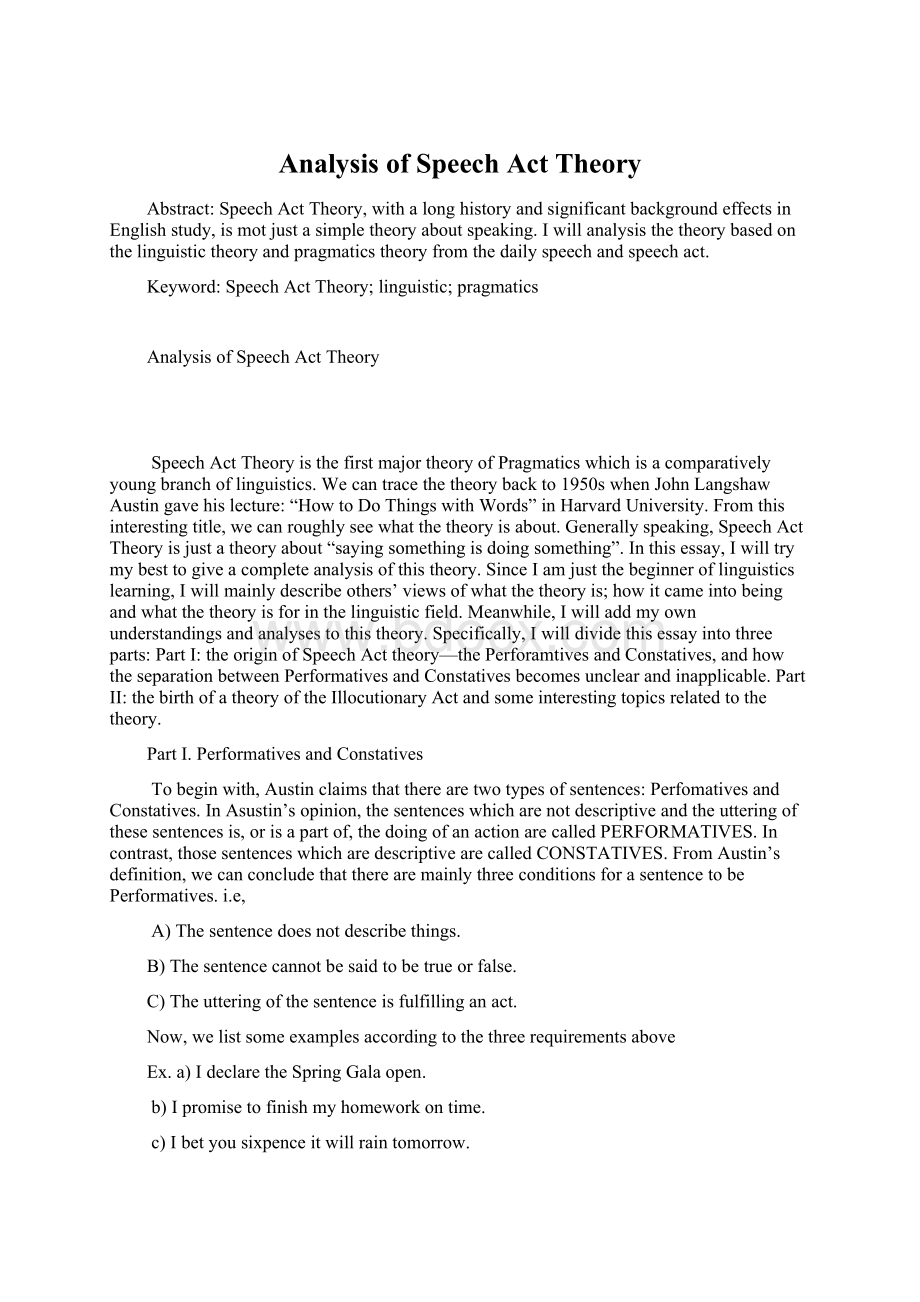Analysis of Speech Act Theory.docx
《Analysis of Speech Act Theory.docx》由会员分享,可在线阅读,更多相关《Analysis of Speech Act Theory.docx(5页珍藏版)》请在冰豆网上搜索。

AnalysisofSpeechActTheory
Abstract:
SpeechActTheory,withalonghistoryandsignificantbackgroundeffectsinEnglishstudy,ismotjustasimpletheoryaboutspeaking.Iwillanalysisthetheorybasedonthelinguistictheoryandpragmaticstheoryfromthedailyspeechandspeechact.
Keyword:
SpeechActTheory;linguistic;pragmatics
AnalysisofSpeechActTheory
SpeechActTheoryisthefirstmajortheoryofPragmaticswhichisacomparativelyyoungbranchoflinguistics.Wecantracethetheorybackto1950swhenJohnLangshawAustingavehislecture:
“HowtoDoThingswithWords”inHarvardUniversity.Fromthisinterestingtitle,wecanroughlyseewhatthetheoryisabout.Generallyspeaking,SpeechActTheoryisjustatheoryabout“sayingsomethingisdoingsomething”.Inthisessay,Iwilltrymybesttogiveacompleteanalysisofthistheory.SinceIamjustthebeginneroflinguisticslearning,Iwillmainlydescribeothers’viewsofwhatthetheoryis;howitcameintobeingandwhatthetheoryisforinthelinguisticfield.Meanwhile,Iwilladdmyownunderstandingsandanalysestothistheory.Specifically,Iwilldividethisessayintothreeparts:
PartI:
theoriginofSpeechActtheory—thePerforamtivesandConstatives,andhowtheseparationbetweenPerformativesandConstativesbecomesunclearandinapplicable.PartII:
thebirthofatheoryoftheIllocutionaryActandsomeinterestingtopicsrelatedtothetheory.
PartI.PerformativesandConstatives
Tobeginwith,Austinclaimsthattherearetwotypesofsentences:
PerfomativesandConstatives.InAsustin’sopinion,thesentenceswhicharenotdescriptiveandtheutteringofthesesentencesis,orisapartof,thedoingofanactionarecalledPERFORMATIVES.Incontrast,thosesentenceswhicharedescriptivearecalledCONSTATIVES.FromAustin’sdefinition,wecanconcludethattherearemainlythreeconditionsforasentencetobePerformatives.i.e,
A)Thesentencedoesnotdescribethings.
B)Thesentencecannotbesaidtobetrueorfalse.
C)Theutteringofthesentenceisfulfillinganact.
Now,welistsomeexamplesaccordingtothethreerequirementsabove
Ex.a)IdeclaretheSpringGalaopen.
b)Ipromisetofinishmyhomeworkontime.
c)Ibetyousixpenceitwillraintomorrow.
Austinoncecalledsentenceslike“Ipromise…Iknow…etc.”RitualPhrases(程式用语).Later,heusedPerformativestoreplaceRitualPhraseinhislecture“HowtoDoThingswithWords”.Hesaidthatifweusethesesententialforms,wearefulfillinganact.However,thesesentencesmustbeutteredunderFelicityCondition(合适条件)includingproperprocess,people,situationandthoughts.IftheFelicityConditionisviolated,youarenotfulfillinganactevenyouutterthesentence“IdeclaretheSpringGalaopen”.SupposeyouaregoingtobeashowmanoftheSpringGalaandyoushouldmakesuchdeclarationintheopeningceremony.However,ifyouarepracticingthissentenceathome,thesentenceyouareutteringisnoteffective,becauseyouarenotmakingthedeclarationintherightplaceattherighttime.
However,AustinsoonfoundthattheseFelicityConditionswerenotapplicableasheimagined.TheyarejustappliedtosomePerformatives.Forexample,whenweusePerformatives,wedonotnecessarilyneedtoobeytheseconditions.Wecanuse“Igivemyword”toreplace“Ipromise”,orevenwecanuseConstativestoreplacePerformatives.Forexample:
“I’llcomeatnineo’clock”.Ontheotherhand,ConstativesalsoneedFelicityCondition.“ThepresentKingofFranceisbald”isnotsuitableforthepresentFrenchpoliticalsystem.
SincetheseconditionscannotbetheeffectivedistinctionsbetweenPerformativesandConstatives,Austinbegantofindanotherwaytodistinguishthem.HefocusedhiseyesongrammaticaldifferencebetweenPerformativesandConstatives.HefoundthatsomanyPerformativesuseFirstPersonSingular,PresentTense,ActiveVoice,andIndicativeMood.CanthesebethesignsforasentencetobePerfomative?
Absolutelynot.AustinfoundthatPerformativesalsocanuseFirstPersonPlural,SecondPerson,evenThirdPerson,PastTense,PassiveVoiceandImperativeVoice.Lookatthefollowingexamples:
Ex.a)Wepromisetocleantheroomafterwards.
b)Youareherebyauthorizedtopayforthepurchase.
c)Passengersarewarnedtocrossthetrackbybridgeonly.
d)Turnright
AlthoughthereareobviousdifferencebetweenPerformativesandConstatives,theyalsosharemanycommonalities.Aboveall,theycanbetransformedintotheotherformbyanotherexpressionwithoutviolatingtherules.Suchas(Ipromisetofinishitontime=Iwillfinishitontime).TheoriginalpurposetodividesentencesintoPerformativesandConstativesistointensifythatsomewordsaredeeds.Orrather,sometimestosaysomethingistodosomething.However,Austinfoundthatwheneverwesaysomethingcanberegardedaswedosomething.Therefore,itseemsworthlesstodistinguishPerfomativesandConstativesandeveryproblemshouldbereconsideredfromgroundupagain.Then,atheoryoftheIllocutionaryActiscryingoutforattention.
PartIIATheoryoftheIllocutionaryAct
SincethedistinctionbetweenPerformativesandConstativescannotwellsatisfytheSpeechActTheory,Austinputforwardanothermoreeffectivetheory—theTheoryoftheIllocutionaryAct.InthelaterpartofHowtoDoThingswithWords,Austinmadeafreshstartontheproblemandconsidereditfromthegroundupagain,i.e.inwhatsensetosaysomethingistodosomething.Asheputit,“everysentencecanbeusedtofulfillanact”.Whycaneverysentencebeusedtofulfillanact?
Austinclaimedthatwhensomeonespeaks,heactuallycompletesthreeactions:
LocutionaryAct(说话行为);IllocutionaryAct(行事行为);PerlocutionaryAct(取效行为).Here,wejustfocusouranalysisontheIllocutionaryAct.
AustinemphasizedthatfulfillingaLocutinaryactisfulfillinganIllocutionaryact.Forexample,whenwearefulfillingalocutionaryact,wealsofinishtheseactions:
putforwardoransweraquestion,provideinformationandpromise,declareaverdictorpurposeandvarioussimilaractions.NowwecangiveadefinitiontotheIllocutionaryact:
Anactwhichistoshowthespeaker’sintension.i.e.toshowwhythespeakersaylikethat,orrather,toshowwhatthespeakermeansbysayingthat.Inotherwords,whenwespeak,wenotonlyproducesomeunitsoflanguagewithcertainmeaning,butalsomakeclearourpurposeinproducingthem,thewayweintendthemtobeunderstood,ortheyalsohavecertainforcesasAustinpreferstosay.AlthoughAustinacknowledgedthat“force”canberegardedaspartof“meaning”,heclaimedthatitisbettertodistinguish“force”from“meaning”justasdistinguish“sense”from“reference”.
However,JonathanCohenviolentlyopposedtheTheoryoftheIllocutionaryAct.Hesaidthattheitismeaninglesstodistinguish“force”from“meaning”,orrather,itisratherdifficulttorecognizewhichis“force”andwhichis“meaning”inonesentence.Forexample,inthefollowingtwosentences,itishardtoseparate“force”from“meaning”.Inotherwords,“force”and“meaning”arethesameinthetwosentences:
Ex.a)Isitraining?
b)Iaskwhetheritisraining.
Bothofthesetwosentencesareaskingwhetheritisrainingornot,sothe“force”equalsto“meaning”inthetwosentences.However,weshouldacknowledgethatAustin’sdistinguishing“force”from“meaning”isreasonable.Forexample,someonemaysaytoyou:
“Youareafool”,andthenyoumayask:
“Whatdoyoumean?
”Youasklikethis,notbecauseyoudon’tunderstandthesenseoftheword“fool”andthereferenceoftheword“You”.Whatyoudonotreallyunderstandisthepurposeofthespeaker.Ontheotherhand,youprobablyknowtheintensionofthespeaker,but“Whatdoyoumean?
”showsyourdisagreementtoother’scomments.Theexampleperfectlyshowsthat“force”and“meaning”canbedistinguished.EveninCohen’sexample:
“Isitraining?
”,“Iaskwhetheritisraining.”,thetwosentencehavedifferentforces.Wecanuse“Isitraining?
”toinquirewhetherwecangoout,whetherweshouldtakeanumbrella.However,whenwesay“Iaskwhetheritisraining”,wemaynotbesatisfiedwithother’sanswerto“Isitraining?
”Therefore,twosentenceswiththesamemeaninghavedifferentforces.
JohnSearle,thestudentofAustin,alsoacknowledgedthatitisdifficulttodistinguishLocutionaryActandIllocutionaryAct,buthehashisownsolutiontothisproblem,thatis,useothertechnicalwordstoreplaceLocutionaryAct.AustinoncedividedLocutionaryActintothreesmallacts:
PhoneticAct(发音行为),PhaticAct(措辞行为),RheticAct(表意行为).
Ex.a)Hesaid:
“Getout!
”------PhaticAct
b)Hetoldmetogetout.--------RheticAct
c)Shesaid:
“Aretheyathomeorschool?
”--------PhaticAct
d)Sheaskedwhethertheywereathomeorschool.-------RheticAct
Fromtheseexamples,wecanconcludethattheverbs“tell”and“ask”weusearejustIllocutionaryVerbs.Therefore,wecansafelysaythatPhaticActoverlapstheIllocutionaryActtosomeextend.Howtosolvethisproblem?
Searlesuggestedthatweuse“PropositionalAct”toreplace“PhaticAct”,andremaintheotherthreeacts.InSearle’sopinion,PropositionalActsequalstoReference(指称)andStatement(陈述).Thus,thedistinctionbetweenLocutionaryActandIllocutionaryActbecamethedistinctionamongthefouracts:
PhoneticAct,PhaticAct,PropositionalActandIllocutionaryAct.
Here,IshouldpointanotherinterestingpointthathowtotranslatetheIllocutionaryActintoChinese.Intheearlydays,somescholarsjusttranslateditinto“言外行为”forthesakeofconvenience.Whatismore,“言外行为”canwellfitupwithChine